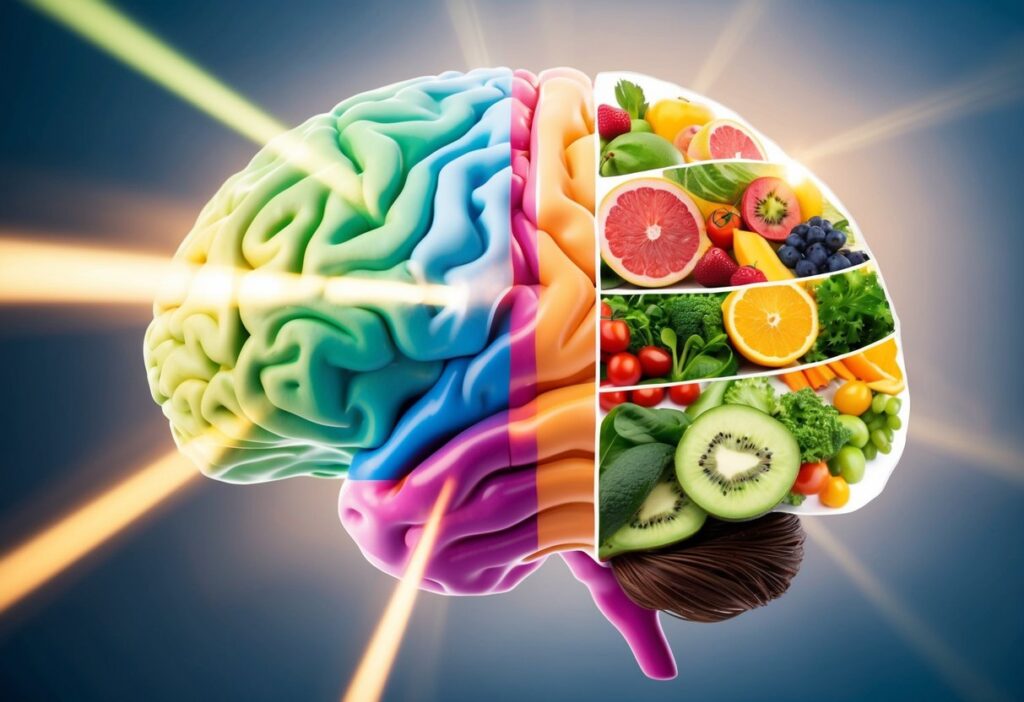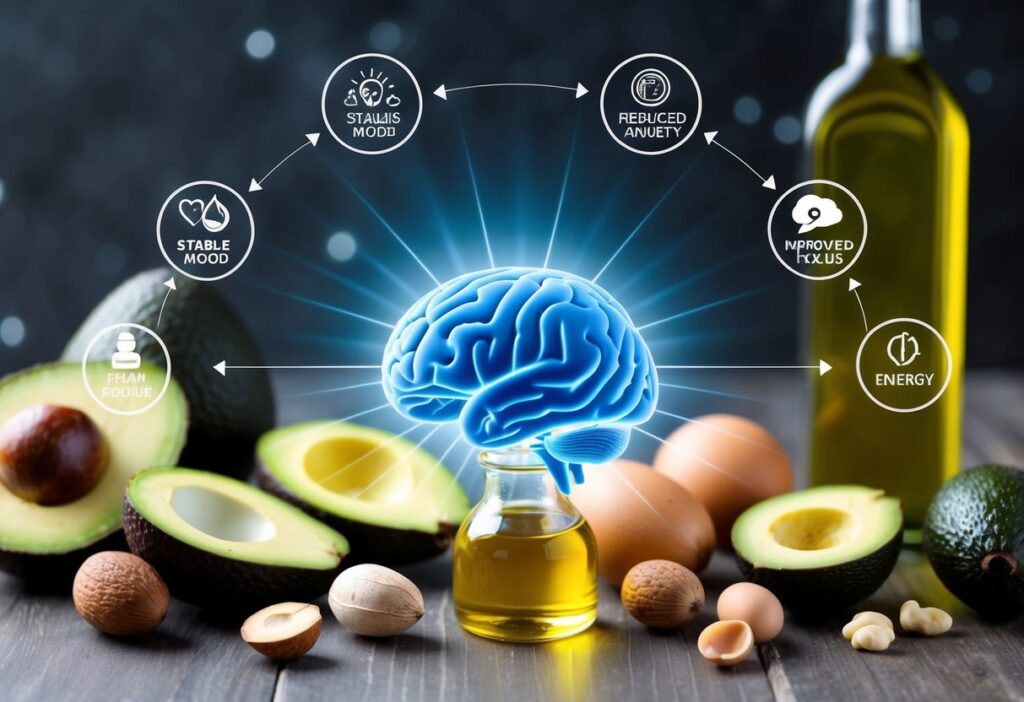Keto Diet for Mental Health: Boost Mood & Reduce Anxiety Naturally
This post may contain affiliate links. If you purchase through these links, I may earn a small commission at no extra cost to you. LEARN MORE.
Struggling with low moods or anxiety? Enter the game-changer—the Keto Diet. This revolutionary eating plan is not just about shedding pounds; it’s a powerhouse for boosting mental health.
Welcome to our guide on the Keto Diet for Mental Health: Boost Mood & Reduce Anxiety Naturally. Dive into a world where what you eat transforms how you feel.

Imagine a diet that not only fuels your body but also nourishes your mind. Say goodbye to the rollercoaster of emotions and hello to a steadier, calmer you.
Join us as we unravel the science behind how the Keto Diet can uplift your spirits and alleviate anxiety. Discover the link between the food on your plate and the state of your mind.
It’s time to take control of your mental well-being naturally, starting with what’s on your menu. Let the Keto Diet be your ally in the journey to a happier, healthier you.
New to keto? Check out our Custom Keto Diet Explained for Beginners guide for a comprehensive start!
Understanding the Impact of Diet on Mental Health

The connection between diet and mental health is more profound than many people realize. Nutrition plays a crucial role in brain function, influencing everything from mood regulation to cognitive performance.
When we consume foods rich in essential nutrients, we equip our brains with the building blocks necessary for optimal functioning. Conversely, a diet high in processed foods, sugar, and unhealthy fats can lead to a decline in mental well-being, exacerbating issues such as anxiety and depression.
This relationship underscores the importance of mindful eating and the potential for dietary changes to improve mental health.
For more insights on how diet impacts overall health, read our article on Keto for Longevity.
Research indicates that certain dietary patterns can significantly affect mood disorders. For example, diets high in refined sugars and unhealthy fats have been linked to an increased risk of depression and anxiety.
On the other hand, diets rich in whole foods, including fruits, vegetables, lean proteins, and healthy fats, have shown promise in enhancing mood and reducing symptoms of anxiety. This suggests that our dietary choices can either support or hinder our mental health, making it imperative to evaluate what we consume daily.
With the rise of the ketogenic diet, many have begun exploring its implications for mental health. The ketogenic diet, characterized by low carbohydrate intake and high fat consumption, alters the body’s energy source from glucose to ketones.
This metabolic shift not only affects physical health but also has significant implications for brain health. By understanding the intricate relationship between diet and mental well-being, we can harness the power of nutrition to foster a healthier mind.
Benefits of the Keto Diet for Mental Health

The ketogenic diet offers a myriad of benefits that extend beyond weight loss and physical health. One of the most significant advantages for mental health is its potential to stabilize mood.
Many individuals who adopt the keto diet report experiencing fewer mood swings and an overall uplift in their emotional states. This improvement can be attributed to the diet’s ability to regulate insulin levels, which in turn stabilizes blood sugar levels. Fluctuating blood sugar can lead to irritability and anxiety, making the keto diet a viable option for those seeking emotional stability.
Curious about the science behind these benefits? See our detailed discussion in Keto for Brain Health.
Another remarkable benefit of the keto diet is its neuroprotective properties. The brain thrives on ketones, which are produced when the body breaks down fats. These ketones serve as an efficient energy source for brain cells, promoting better cognitive function and mental clarity.
Additionally, studies suggest that ketones may have anti-inflammatory effects, potentially reducing neuro-inflammation linked to mood disorders. As a result, individuals on a ketogenic diet may experience sharper focus, improved memory, and enhanced overall cognitive performance.
Furthermore, the keto diet may help reduce anxiety levels. By minimizing carbohydrate intake, the diet encourages the consumption of healthy fats and proteins, which can lead to a more balanced neurotransmitter environment.
Neurotransmitters like serotonin and gamma-aminobutyric acid (GABA) play crucial roles in regulating mood and anxiety. When these neurotransmitters are balanced, individuals may find themselves feeling calmer and more centered.
Thus, the keto diet not only aids in physical health but also serves as a powerful tool for enhancing mental well-being.
How the Keto Diet Boosts Mood and Reduces Anxiety

The ketogenic diet’s mood-boosting effects can be traced back to its impact on brain chemistry. When the body enters a state of ketosis, it begins to produce ketones, which serve as an alternative energy source for the brain.
This change in energy metabolism can lead to enhanced production of neurotransmitters that regulate mood, such as serotonin and dopamine. A well-regulated neurotransmitter environment is crucial for maintaining emotional balance and reducing anxiety.
Additionally, the keto diet has been shown to help mitigate the effects of oxidative stress in the brain. Oxidative stress occurs when there is an imbalance between free radicals and antioxidants in the body, leading to cellular damage.
This damage is often linked to mood disorders, including anxiety and depression. The high-fat, low-carb nature of the keto diet encourages the consumption of foods rich in antioxidants, such as leafy greens and avocados, which can help combat oxidative stress and promote brain health.
Moreover, the keto diet promotes a reduction in inflammation throughout the body, including the brain. Chronic inflammation has been associated with various mental health issues, including anxiety and depression.
By following a keto diet, individuals can decrease the levels of pro-inflammatory markers in their bodies, potentially leading to a more stable mood and decreased feelings of anxiety. This reduction in inflammation, combined with the other biochemical changes induced by the diet, creates an environment where individuals can thrive both mentally and emotionally.
Want to learn more about reducing inflammation? Check out our Keto and Gut Health: Unlocking Microbiome Secrets post.
Scientific Evidence Supporting the Keto Diet for Mental Well-being

Numerous studies have begun to explore the relationship between the ketogenic diet and mental health, yielding promising results. One pivotal study published in the journal Neuropsychobiology revealed that individuals with mood disorders experienced significant improvements in their symptoms after adopting a ketogenic diet.
Participants reported enhanced mood stability and a marked decrease in anxiety levels, indicating the diet’s potential as a therapeutic intervention for mental health issues.
Furthermore, research has demonstrated that individuals with epilepsy—many of whom experience comorbid psychiatric conditions—can benefit from a ketogenic diet. A study published in Epilepsia found that the diet not only reduced seizure frequency but also improved mood and cognitive function in participants.
This suggests that the neuro-protective effects of the ketogenic diet may extend beyond epilepsy, offering potential benefits for those struggling with various mood disorders.
Another compelling piece of evidence comes from a study conducted by researchers at the University of California, which assessed the effects of the ketogenic diet on anxiety in animal models. The findings indicated that animals fed a ketogenic diet exhibited lower anxiety-like behaviors compared to those on a standard diet.
This animal research provides a foundation for further exploration of the keto diet’s impact on human mental health, paving the way for more extensive clinical trials to validate these findings.
Try our custom keto diet, for your personalized meal plan for 8 weeks to see the incredible result!
Implementing the Keto Diet for Mental Health: Tips and Tricks

Transitioning to a ketogenic diet can be both exciting and challenging. To maximize its mental health benefits, it’s essential to approach the diet thoughtfully. Start by gradually reducing carbohydrate intake while increasing healthy fats.
This gradual shift can help minimize potential side effects, such as the “keto flu,” which may include fatigue and irritability during the initial transition phase. Incorporating healthy fats like avocados, olive oil, and coconut oil can help ease this transition and provide sustained energy.
Focus on nutrient-dense foods that support brain health. Incorporate fatty fish, such as salmon and mackerel, which provide essential omega‑3 fatty acids known to support mental well-being.
Nuts and seeds are excellent additions, as they are rich in healthy fats and antioxidants that combat oxidative stress. Ensuring a well-rounded intake of vitamins and minerals is crucial for maintaining overall health and supporting brain function during this dietary shift.
Not sure where to start? Explore our Custom Keto Diet Explained for Beginners for a step-by-step guide.
Finally, consider tracking your food intake and mood changes to assess the impact of the keto diet on your mental health. Keeping a journal can help identify patterns between your dietary choices and emotional responses, allowing you to make informed adjustments.
Joining online communities or local support groups can also provide encouragement and motivation during your keto journey.
Recipes and Meal Plans for a Keto Diet Focused on Mental Wellness

Creating delicious meals while adhering to a ketogenic diet can be both enjoyable and beneficial for mental health. A well-planned meal can incorporate a variety of nutrients that support brain function.
For breakfast, consider a spinach and feta omelet cooked in olive oil, accompanied by a side of avocado. This meal is not only low in carbs but also packed with healthy fats and antioxidants, setting a positive tone for the day.
For lunch, a grilled salmon salad topped with mixed greens, cherry tomatoes, and a lemon-olive oil dressing provides an excellent source of omega‑3 fatty acids. Salmon is known for its neuroprotective properties, while the greens and tomatoes add essential vitamins and minerals. This meal supports physical health while contributing to improved mood and cognitive function.
Dinner might feature a stir-fry made with zucchini noodles, bell peppers, and chicken, sautéed in coconut oil. Adding a sprinkle of sesame seeds and fresh herbs enhances flavor and provides additional nutrients. Pair this dish with a side of sautéed kale, rich in vitamins A and K, further promoting brain health.
For more tasty and brain-boosting recipes, visit our Keto Recipe Ideas: Delicious Meals for a Low-Carb Lifestyle post.
Combining the Keto Diet with Mindfulness and Stress Management Techniques

While the ketogenic diet can significantly impact mental health, combining it with mindfulness and stress management practices can further enhance its benefits. Techniques such as meditation and deep breathing exercises can cultivate greater awareness of your thoughts and emotions, leading to better emotional regulation.
Additionally, regular physical activity releases endorphins—the body’s natural mood lifters—promoting a sense of well-being.
Engaging in activities like yoga, walking, or group fitness classes can complement the keto diet by boosting energy levels and reducing anxiety. Social interactions, whether through group activities or shared meals, can also foster a sense of community and support during your transition.
For additional stress management strategies, check out our Keto for Longevity article.
Potential Risks and Considerations When Following a Keto Diet for Mental Health

While the ketogenic diet offers numerous benefits for mental health, it is essential to approach it with caution. One potential concern is the possibility of nutrient deficiencies if the diet isn’t well-balanced.
As carbohydrate intake decreases, ensuring an adequate intake of vitamins and minerals from other sources becomes crucial. Incorporate a variety of non-starchy vegetables, nuts, seeds, and high-quality proteins to mitigate this risk.
Some individuals may experience the “keto flu” during the initial transition, with symptoms such as fatigue, irritability, headaches, and brain fog. These effects are usually temporary, but staying hydrated, maintaining electrolyte balance, and gradually transitioning to keto can help ease discomfort.
If you have pre-existing health conditions, be sure to consult a healthcare professional before starting any new diet. For personalized advice, see our Keto Diet for Beginners guide.
Conclusion: Embracing the Keto Diet as a Tool for Improving Mental Well-being
The ketogenic diet presents a promising approach for enhancing mental health naturally. By understanding the profound connection between what you eat and how you feel, you can make informed choices that support emotional stability and cognitive function.
Through its ability to regulate blood sugar, promote neuro-protection, and reduce inflammation, the keto diet offers a multifaceted strategy for improving mood and alleviating anxiety.
As you embark on your keto journey, remember to integrate mindfulness, regular exercise, and quality sleep into your routine. This holistic approach amplifies the benefits of the keto diet, empowering you to take control of your mental well-being.
Ready to transform your mental health? Discover the Custom Keto Diet now and start your journey to a happier, healthier you!
For more insights on optimizing your keto lifestyle, visit our Keto for Brain Health post.
